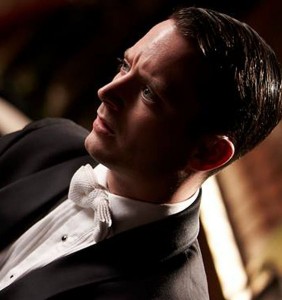The (not-so) Grand Piano
It was an awkward elevator ride to the parking garage filled with movie critics and an awkward silence. You could hear a pin drop as each writer’s brain sadly contemplated director Eugenio Mira’s latest foray into the thriller genre.
The silence was suddenly broken by an elderly gentleman who looked like he wanted to do nothing more than send Mira to a work camp for the theft of the last 90 minutes of his life. His vain stab at optimism was the wittiest line heard since the previews.
“At least they didn’t blow up an airplane,” he said with a chuckle.
Unfortunately, that is about all that can be said for Grand Piano, a film that tells the story of Tom Selznick (Elijah Wood), a concert pianist who returns for the performance of his life after an episode with tremendous stage fright caused him to give up the profession years earlier. The movie, which premiered in Austin, Tex., at Fantastic Fest last September, hits theaters today in limited release. Watching the film is like the movie’s vague description of watching that early performance of Selznick’s — a remarkable and promising beginning that came to a cataclysmic end when it came time to play the last four bars.
As Selznick sits down at the piano bench in front of a sold out Chicago concert hall, he notices a note on his music sheet: “Play one wrong note, and you die.” Suddenly, Selznick — who already had fantastic stage fright — finds himself talking to an assassin (John Cusack) over an earpiece as he searches for answers about the sniper’s motive.
At around the midpoint of the film’s 90-minute run time, things start to sound a bit off-key. Whether the entire screenwriting staff ran out of hallucinogens or began watching rejected endings to M. Night Shyamalan films is anyone’s guess — but the fate of two of Selznick’s guests in the audience, Ashley (Tamsin Egerton) and Wayne (Allen Leech), begins this concert film’s descent into the orchestra pit. From there, the film rushes toward a dramatic conclusion that has more split ends than an Amanda Bynes wig.
On top of that, the film is built on a foundation of characters that seem to be stuck at middle-C. Wood turns in an above-average performance, but struggles to relate in key moments and adopts a remarkably lifeless expression in exactly the wrong moments. Kerry Bishé, as Tom’s wife, Emma, acts out a role that seems recruited from the average high school drama class. Like an animated Barbie, she watches the performance from a luxury space in the balcony; and for all of her camera time, it’s unclear what her role is other than to be on the receiving end of the sniper’s threat to blow her skull all over the seats if Tom fingers the wrong note.
The film briefly explores the juxtaposition between Emma, a shallow movie star with no real talent but plenty of appreciation, and Tom, a deeply gifted pianist who struggles to maintain a constant fan base. Sadly, this theme gets about as much attention as D-sharp and ends up in the ever-growing “lost potential” column. Another interesting motif the movie teases takes place backstage, when Selznick expresses his nerves at playing a wrong note to his conductor (Don McManus). The pair comes to the conclusion that no matter what happens on stage, the average audience never knows if a wrong note is played. It seems the producers of Grand Piano read this theme quite literally.
Yet for a movie about a concert, it is a predictable yet pleasant surprise that the score is the film’s greatest attribute. Wood, who took piano lessons as a child and spent three weeks training with an instructor to prepare for the film, delivers a beautiful performance on the ivories that reminds the audience of the true beauty of classical music. Sadly, a crash course in classical music appreciation is not worth the price of admission.
With every scene that convinces the audiences that Grand Piano has found a light at the end of a tunnel, it becomes clear that the approaching light is really an oncoming train. The plot careens hurriedly toward a clichéd and perplexing end, the cast remains in the shallow end of the kiddie pool and the film’s most interesting themes are left unexplored in favor of carelessly constructed adrenaline rushes as they come crashing down (literally). on stage. If there is any shred of optimism to close with, viewers can at least be glad that what comes crashing down on stage is not, in fact, an airplane.

